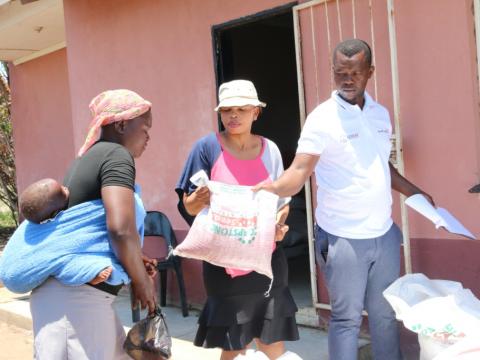World Vision Swaziland distributing sorghum to 6,000 farmers

World Vision Swaziland has been distributing 5kg sorghum seeds to 6 000 farmers in six constituencies in the country amounting to E498 000 (US$35 570). This is the El Nino Agriculture and Food Security Project funded by USAID/OFDA. The seeds are given to farmers from the driest parts of the country, where they are unable to grow maize crop due to heat and scarcity of rain.
Fakazile Dlamini (53) of Mpolonjeni said she was excited that World Vision was giving them sorghum seeds. “I was lucky last year I received sorghum seeds and for the first time in many years I harvested something. Over the years we have been discouraged because each time we plough maize, it will dry up. Last year I was trying my luck with sorghum and I was not expecting much because of heat. However, I was surprised of the bumper harvest. Even today I am still enjoying them,” she said.
Fakazile said this time around, she was going to plant them as soon as it starts raining. She said this time around she was going to scare away the birds that were feasting in her field because she wants more harvest. “Who knows I might start selling the excess to the local market,” she said with excitement.
Khetsani Dlamini another farmer at Mpolonjeni from a family of 10 said she was quite happy with sorghum and up to today she is still feasting on her harvest from last season. “I use my sorghum to cook thin porridge, thick porridge and emahewu. Last year I also planted maize after we received rains but didn’t harvest anything. I was so disappointed but I was so comforted by the sorghum,” she said. With her harvest she is also feeding an old disabled woman who is her neighbour.
Other constituencies that benefited from this project included Lomahasha, Sithobela, Somntongo, Matsanjeni and Lubulini. Lomahasha had the highest number of beneficiaries which are 2 058.
Project Manager Ntandoyenkhosi Mlangeni said the project was targeting those areas which were hard-hit by the drought and they were assisting farmers with drought resistant crops such as sorghum and cowpeas.
“Currently we are distributing sorghum and next year January we will distribute cowpeas. We are delaying the distribution of cowpeas because some farmers then decide to plant earlier hence compromising the quality and the harvest,” Mlangeni said.
The farmers were trained on sorghum and cowpeas farming. The organisation further conducted food demonstrations displaying different dishes from sorghum and cowpeas.